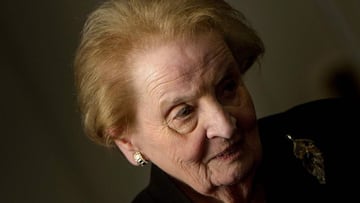Former US Secretary of State dies aged 84: How did Madeleine Albright die?
The death of the first women to lead the State Department was announced on Wednesday by her family. Who was Madeleine Albright and what did she stand for?


On Wednesday the family of former Secretary of State Madeleine Albright released a statement confirming that she had passed away at the age of 84.
She served from 1997 to 2001 during the Clinton administration, becoming the first women to hold the role of Secretary of State in US history. She helped redefine American foreign policy after the Cold War and took an active role in key policy decisions for then-President Bill Clinton.
The statement from her family confirmed that the cause of death was cancer.
It reads: “Madeleine Albright, born Marie Jana Korbelova, was a native of Prague who came to the United States as a refugee in 1948 and rose to the heights of American policy-making, receiving the Presidential Medal of Freedom in 2012, the nation’s highest civilian honor.”
Below is a statement from the family of @Madeleine: pic.twitter.com/C7Xt0EN5c9
— Madeleine Albright (@madeleine) March 23, 2022
What did Madeleine Albright stand for?
Albright was known as a fierce defender of human rights and a diplomat who sought to stand up for under-represented peoples around the world. During her time in office she pushed for the expansion of NATO, fought to reduce nuclear armaments across the world and encouraged greater intervention in the Balkans to stop the genocide.
Albright was a vocal critic of some of the most brutal regimes of the 1990s, accusing Serbian leader Slobodan Milosevic of committing “a horror of biblical proportions” for his attempts to eradicate the non-Serbian population.
The US’s eventual involvement in Serbia saw some christen the conflict ‘Albright’s War’, but she said in 1999: "We cannot watch crimes against humanity."
Very sad about Madeleine Albright, a lovely, great, proud American who always understood the importance of democracy here and abroad.
— Michael Beschloss (@BeschlossDC) March 23, 2022
She participated in ultimately unsuccessful peace talks between representatives from Israel and Palestine, and attempts to encourage North Korean ruler Kim Jong Il to move away from the country’s nuclear policy
She was also noted for her sense of humour and a habit of using decorative pins and broches to convoy a foreign policy message. Iraqi leader Suddam Hussein described Albright publically as a “snake” and she took to wearing a golden snake pin brooch in response. She proudly wore a small broom on her lapel after being called a witch, and even sported a large brooch of an insect after reports emerged that Russian operatives had bugged the State Department.
Madeleine Albright quotes
Only last month Albright authored an op-ed in the New York Times, calling for Russia to de-escalate tensions in Eastern Europe as rumours of an invasion of Ukriane swirled.
She wrote: "Instead of paving Russia's path to greatness, invading Ukraine would ensure Mr. Putin's infamy by leaving his country diplomatically isolated, economically crippled and strategically vulnerable in the face of a stronger, more united Western alliance."
"It took me a long time to find my voice. But having found it, I'm not going to shut up."
Madeleine Albright
She frequently reiterated the importance of US involvement on a global scale, telling NBC in 1998: "We stand tall and we see further than other countries into the future, and we see the danger here to all of us... I know that the American men and women in uniform are always prepared to sacrifice for freedom, democracy and the American way of life."
Related stories
Speaking to CNN in 2005 she outlined the issues she had faced being the first women to hold the position of US Secretary of State. However she retained a confidence in her abilities:
"I think that there were real questions as to ... whether a woman could be secretary of state. And not just in terms of dealing with the issues, but in terms of dealing with the people, especially in hierarchical societies. ... I found, actually, that I could do that."

